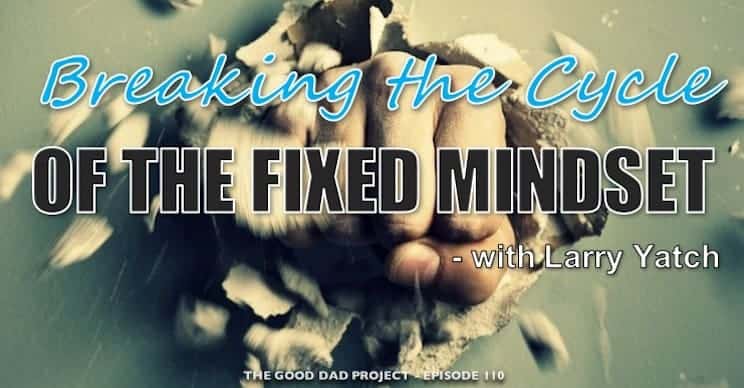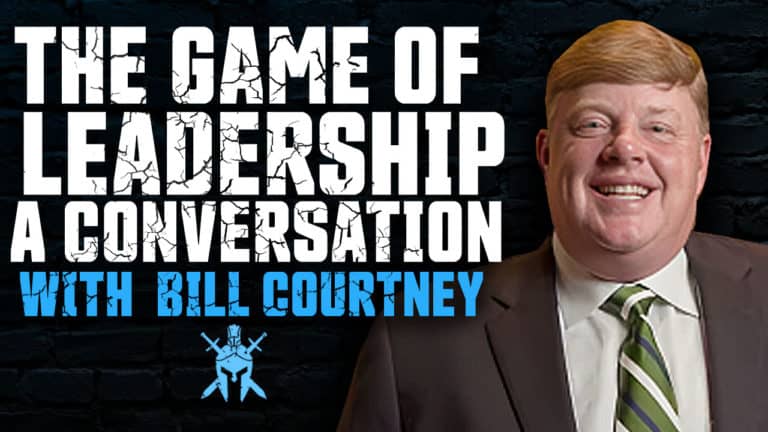How to Break the Cycle of the Fixed Mindset with Larry Yatch
Today’s guest needs no introduction. Larry Yatch from the SEALed Mindset is back on the Good Dad Project podcast to answer a few questions from our Dad Edge community about how to break the cycle of the fixed mindset in our kids and in ourselves.
Larry Yatch and the SEALed Mindset
For those of you who haven’t listened to Larry Yatch’s episodes, he is a former Navy SEAL who has used his elite training and past experiences to formulate a system to teach the fundamentals of leadership, teamwork, courage, and the growth mindset to school kids, civilians (like the SEALed Mindset GDP Special Membership), all the way up to executives and corporations.
How to Break the Cycle of the Fixed Mindset
The fixed mindset is the belief that intelligence, skill, and talent is given to us as traits, like the color of our eyes. We believe either we are good at something or we are not, which leads to a tendency to avoid trying difficult things. Many of us are stuck in the cycle of the fixed mindset and are unwittingly instilling it in our kids by praising them the wrong way.
Johnny’s really good at baseball.
The growth mindset is the belief that skills are developed and that the more work we put in, the better we will become at something. In the growth mindset, challenges are welcome. We embrace difficulty knowing that each experience forces us to get better. We instill this mindset by praising effort.
Johnny works really hard at baseball.
What to expect from adopting the growth mindset
“I love the concept of growth mindset, and both my wife and I are working hard to instill this in our parenting. A challenge that I face is being realistic with my own expectations. How can I invite and live a life with a growth mindset and positive attitude without immersing myself to the point where it has a negative effect?” – Jeff
If we see a negative effect and feel defeated, that means we’re still operating in the fixed mindset. Simply put, even when we’re trying to implement a growth mindset, most of us don’t know that we’re still reinforcing the fixed mindset. In the growth mindset, defeat and difficulty are positive things. There can not be a negative effect.
How do we know when we’re pushing to far?
“I have a question about pushing my kids to face their fears and overcome obstacles. When do you ignore their cries and push them ahead, and what is too far?” – Andy
The problem we have with instilling the growth mindset at an early age is that we understand it at an adult level and try to implement it in a logical way. But, as all dads know, logic and reasoning don’t work with three-year-olds. These processes have to do with self-regulation, and this part of a child’s brain doesn’t exists yet. It’s our job as parents to be this part of the brain for them.
In the meantime, we can use operant conditioning to modify behaviors. This means offering positive reinforcement and negative reinforcement for particular behaviors. We have to be careful though. Our children can use the same techniques to get what they want and may actually be conditioning us.
What can we men do when faced with something beyond our control?
I took this opportunity to ask Larry Yatch my own question. Regular listeners know that I went through a debilitating 33 days of insomnia. I was at a point in my life where my business, mastermind group, and podcast were never better. I was in the best physical shape of my life and my family was thriving. Then it all was in danger of collapsing when I couldn’t sleep. I asked Larry what could I have done differently.
Larry Yatch first told me I should’ve asked for help earlier. We men tend to try to handle things ourselves. We’re supposed to have all the answers, but we don’t. This is when we need to ask others for their help an advice. Asking for help does show weakness. It is empowering, and the person whom you allow to help you will feel better about themselves. Asking someone to help you is a gift.
Become a member of the SEALed Mindset
Now is your last chance to sign up for the SEALed Mindset Leaders at the unbelievable rate of $25 a month (normal price $250 a month!). This discount is extended for only 90 days. DISCOVER HOW THE NAVY SEALS:
- OPTIMIZE PERFORMANCE DESPITE CHALLENGES
- LEVERAGE MENTAL TOUGHNESS, EMOTIONAL RESILIENCE, AND GRIT TO ACHIEVE SUCCESS
- BUILD UNBREAKABLE RELATIONSHIPS THAT LEAD TO FULFILLMENT
- MASTER PERSEVERANCE TO ACHIEVE GREATNESS IN THE FACE OF IMMENSE OBSTACLES
Get started with the FREE new webinar. Click here> SMLdad.com
Resources
==>NEW!!<== Grab a copy of The Dad’s Edge AUDIOBOOK on iTunes or Audible
GRAB A COPY OF THE DAD’S EDGE HERE
Join our Dad Edge Group on Facebook Request Entry Here
We have new Dad Edge T-Shirts! Grab one HERE
Download a free chapter from: THE DAD’S EDGE on UNLIMITED PATIENCE HERE
Check out this free resource on: CONNECTION WITH YOUR SPOUSE
Download this free resource on: CONNECTION WITH YOUR KIDS
Links
- Amazon Bestselling Book: The Dad’s Edge – 9 Simple Ways to Have: Unlimited Patience, Improved Relationships, and Positive Lasting Memories
- Larry’s New Course: The Dad’s Edge – 6 Strategies to Achieve: Unlimited Patience, Improved Relationships, and Positive Lasting Memories
- Larry’s Twitter Page
- Larry’s Facebook Page
- Larry’s Instagram Page











I really enjoyed this episode (Larry is one of my favorite guests), but I wanted to offer an important clarification about Operant Conditioning. Larry’s definitions of the two types of punishment and reinforcement were very accurate, however, I fear that some dads might take use the example of Negative Punishment as one good way to make their child stop crying. Larry (I believe in an attempt to stick to the example of a crying child) highlighted taking a teddy bear away as a form of Negative Punishment. It is correct that this is an example of Negative Punishment, however, it is very bad way of handling a child crying. This is because a teddy bear is a form of self-soothing for a child. In holding it, they are attempting to calm themselves down and self-regulate. This is actually one of the ways a child will develop self-regulation capacity over time. Therefore, You NEVER want to take away a healthy self-regulation tool to help someone regulate their emotions. With that said, taking car keys away from a misbehaving teen (another example of Negative Punishment) is an effective way to parent.